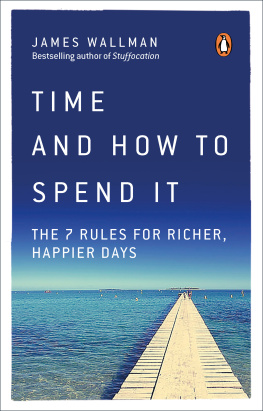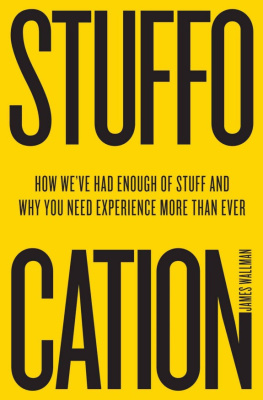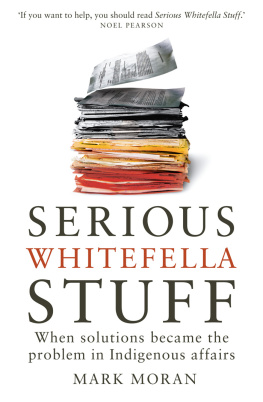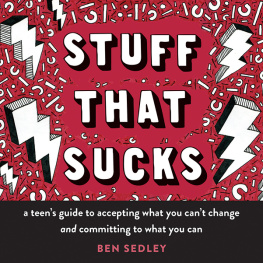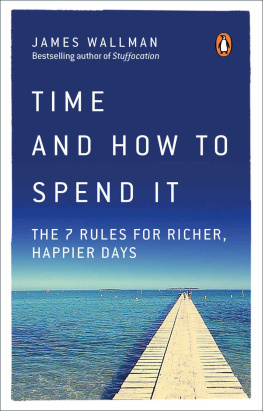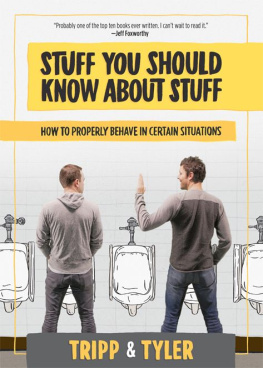
This is a work of nonfiction.
Some names and identifying details have been changed.
Copyright 2013 by James Wallman
All rights reserved.
Published in the United States by Spiegel & Grau, an imprint of Random House, a division of Penguin Random House LLC, New York.
SPIEGEL & GRAU and the HOUSE colophon are registered trademarks of Penguin Random House LLC.
Originally published in the United Kingdom in a digital edition by Crux Publishing in 2013 and subsequently in paperback by Penguin Books Ltd. in 2015.
Grateful acknowledgment is made to the following for permission to use preexisting material:
Grist Magazine, Inc.: Excerpt from The Medium Chill by David Roberts, Grist.org , June 28, 2011, copyright 2011. Used by permission of Grist Magazine, Inc.
Python (Monty) Pictures Limited: Quotes from Monty Pythons Life of Brian by Graham Chapman, John Cleese, Terry Gilliam, Eric Idle, Terry Jones, and Michael Palin. Copyright 1979. Used by permission of Python (Monty) Pictures Limited.
Wallman, James.
Stuffocation : why weve had enough of stuff and need experience more than ever / James Wallman.
pages cm
Includes index.
ISBN 978-0-8129-9759-0
eBook ISBN 978-0-8129-9760-6
1. Consumption (Economics)Psychological aspects. 2. Consumer behavior. 3. Quality of life. 4. Well-being. 5. Simplicity. I. Title.
HC79.C6W35 2015
306.3dc23
2014036553
www.spiegelandgrau.com
Jacket design: Evan Gaffney
Jacket photograph: Burazin / Getty Images
v3.1
Contents
Introduction
Weve Had Enough of Stuff
One Monday morning in September 2010, a man by the name of Ryan Nicodemus woke up in a room that was bare except for a bed. Outside the sky was blue. There was a light breeze. People were starting the week, sipping coffee, getting in their cars, driving north for Dayton, south for Cincinnati. It was a day like any other.
Nicodemus, a square-jawed Irish American who could pass for the movie star Ben Affleck, sat up and squinted. There was no bedside lamp or table, no pictures, nothingexcept for the bed hed slept on and the sheets hed slept under.
He pulled the sheets back and padded across the carpeted floor, past the empty closets, into the hallway. The house was stripped bare. The only thing in it was an eerie sound. It was really strange, Nicodemus recalls. Like silence, but very echoey.
If you had been there, waking up alone in that house, you would have thought youd woken up in some sort of surreal dream, in a strange house the day after the owners had moved outand left all their things in boxes and trash bags at the foot of the stairs.
Nicodemus went down and picked up a box. He read the labelMiscellaneous no. 7and put it to one side. He picked up anotherKitchen junk no. 2and did the same. He kept going till he found Bathroom no. 1. He rummaged inside. He pulled out shower gel, toothpaste, toothbrush. He started on the bags, till he found, and took out, one towel. He tied the bags closed, he shut the boxes, and he went upstairs to shower.
As water washed over him, Nicodemus wondered. How did it feel? Odd? Better? Was a home with no stuff better or worse? This wasnt a dream, you see. It was an experiment.
At the time Nicodemus was twenty-eight, and doing well. He had a girlfriend, a house, a job. He was making over $100,000 a year, managing stores for a telecom company called Cincinnati Bell. He liked what he did. He liked the people he worked with. He got a kick out of seeing his employees develop, and helping them sell one or two more things, so they could make their bonus or win that incentive trip to Hawaii. He wore Brooks Brothers suits, $300 shoes, and $100 ties. He had a hundred $100 ties. On the weekend, he went off-roading on an $8,000 four-wheeler with his buddies. He played Xbox and watched movies on his top-of-the-line, 53-inch Samsung TV. He drove a brand-new, metallic blue Toyota Tacoma, one of those big boys toys that look like a life-size Tonka Truck.
If youd told my eighteen-year-old self what I was going to have at twenty-eight, Nicodemus says now, I wouldve been the most excited eighteen-year-old there ever was. I wouldve been, Like, are you kidding me? This is gonna be the best life ever!
But ten years later, it did not feel like the best life ever. Nicodemus was not happy. Instead, he was confused. I almost felt, he says, ungratefulcause I had everything Id always wanted.
At first, he kept plugging away, working, spending, hoping the feeling would go. But no matter how much he earned and how many things he bought, he could not shake it. Then a thought occurred to him. Maybe there had been a mistake. Maybe the happiness equation was wrong.
1. THE HAPPINESS EQUATION
Nicodemus grew up poor, in Lebanon, Ohiopopulation twenty thousand, average income $20,000. When his parents split he stayed in a run-down apartment with his mother. She was too busy with drink and drugs to notice the filth, the cockroaches, her son. So, at age twelve, he moved in with his father. Eric Nicodemus ran a small business called Nicodemus Fine Paint and Wallcovering. He was a devout Jehovahs Witness. He kept a clean house. Was it inevitable that Ryan ricocheted like a pinball between his fathers God and his mothers demons? He took drugs. He went to church. He ate a lot.
During school holidays when Ryan worked for his father, he saw how the other half decorated their homes and how they seemed to have the sort of happiness he was looking for.
One day, father and son were in their overalls at a job. The house was nothing fancy. Everything was modern and new, apart from a grandfather clock in the hallway. As Ryan was setting things up, taking the family pictures off the walls, he noticed that the people in the pictures looked really happy. That morning, the owners had seemed pretty happy too. Maybe they were. Looking around he wondered: maybe this nice, middle-class house was the kind of home happy people lived in.
Dad, he said. How much would I have to make to own a house like this?
Son, Eric replied in his gruff, Dad voice. About $50,000 a year.
It was that simple. Happiness had a look: the inside of that house. And it had a price tag: $50,000. Nicodemus shared this golden secrethappiness = $50,000 a yearwith his best friend, Joshua Fields Millburn.
Today, Millburn is slim and good-looking. He looks like a younger version of the actor Christopher Walken. He has a wave of blond hair that rises straight up like Walkens. His smile is halfway between pleased-with-himself and please-listen-to-me. Back then though, he was just like Nicodemus: a fat teenager from a broken home.
After they left school, Millburn and Nicodemus worked their tails off to fulfill their side of the happiness equation. A few years later, they reached the magic number. That meant they should be happy, right? If only life was that simple. Millburn soon worked out the problem.
The equation is wrong, he told Nicodemus one day. We didnt adjust for inflation. Maybe its not $50,000, maybe its $80,000. Now, that made sense. After all, inflation meant things cost more, especially the things you wanted, the good stuff. And if the cost of the good stuff rose, that meant the cost of the good life would go up too.
So they kept on, working, spending, competing. Nicodemus bought a 1,700-square-foot house. Millburn got one that was 2,000 square feet. Nicodemus drove a Toyota. Millburn had a Lexus. Nicodemus owned a hundred ties. Millburn didnt have quite that many, but he did have seventy shirts by Brooks Brothers, and fifteen of their suitsthree more than Nicodemuss twelve.
Next page

